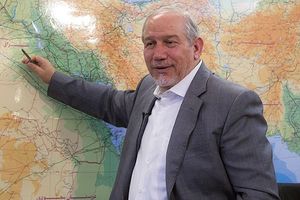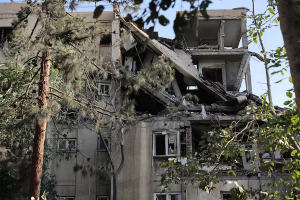Austria suspends all consular services in Iran until 'return to normalcy'

The Austrian Embassy in Iran has suspended all consular services citing an “insurmountable obstacle” but giving no further details or timeline for reopening.

The Austrian Embassy in Iran has suspended all consular services citing an “insurmountable obstacle” but giving no further details or timeline for reopening.
According to the embassy’s official website, all consular services are suspended until further notice, which means that even previously submitted applications cannot be processed.
The announcement also said that existing appointments for residence and settlement services are canceled until the end of September, advising applicants to “book new appointments as soon as the situation has returned to normal.”
No further details were provided about what prompted the decision.
The Austrian foreign ministry told Iran International it was "working to re-establish the conditions which would allow us to resume consular services at the Embassy in Tehran."
However, it said "there is no concrete indication when consular services will resume."
Several embassies and consulates in Iran suspended services in June during the 12-day war with Israel.
The Czech Embassy suspended its services in June and has not yet resumed its operations, though it announced plans to gradually restart services in September.
The German Embassy, citing security concerns, relocated some consular staff to other countries in the region, but continues to provide services in Iran.
Embassies of Portugal, Switzerland, and the United Kingdom also suspended services in June but have since resumed full operations.
The closure of foreign embassies in Tehran during and after the 12-day war left between 3,000 and 4,000 Iranian passports stuck in diplomatic missions, stranding visa applicants, Iranian officials said earlier this month.
Omid Mohammad-Alikhan, a member of Iran’s Association of Travel Agencies, told state news agency IRNA that with some embassies halting tourist visa issuance, between 40,000 and 50,000 people remain in limbo.
The disruption has hit hardest those needing to travel on fixed dates, such as students who must arrive for the start of the academic year and athletes travelling to competitions or training camps.
Iran currently faces a deadline from France, Germany, and the United Kingdom to reach a deal with world powers on its disputed nuclear program by the end of August or face the return of UN sanctions through the so-called "snapback" mechanism.
Iran's foreign minister said on Wednesday that the UN sanctions could return, but that Tehran was working with Russia and China to prepare for such a scenario.

The Iranian rial slid further on Thursday, with the US dollar trading around 957,000 rials in Tehran’s free market, as markets braced for the possible reinstatement of UN sanctions through the so-called "snapback" mechanism.
Sterling reached 1,289,000 rials while the gold coin climbed to 860 million rials, reflecting safe-haven demand amid currency weakness.
The losses come ten days before the European powers' deadline to decide on triggering the mechanism that could reimpose UN sanctions on Iran. Washington has also vowed to halt Tehran’s oil exports to China as part of its maximum pressure campaign.
The snapback mechanism, part of UN Security Council Resolution 2231 that endorsed the 2015 nuclear deal between Tehran and world powers, allows any party to restore UN sanctions if Iran is accused of non-compliance.
France, the UK and Germany have warned Iran they will restore UN measures unless talks resume and produce results by the end of August.
Experts say the looming deadline is driving the rial's downfall. Iranian officials, however, have sought to play down the potential economic fallout of renewed sanctions.
Earlier this month, Foreign Minister Abbas Araghchi said that the consequences of the snapback mechanism had been “exaggerated” and made to appear more serious than they are.
Last week, Iran International reported that Iran’s Ministry of Intelligence has issued confidential guidance to ministries and major companies to prepare for the possible return of punitive UN measures.
The ministry warned of “severe currency fluctuations, reduced purchasing power, increased unemployment, layoffs and heightened social discontent” if sanctions return, and urged companies to seek alternative suppliers in countries including China, Russia and Iraq.
A survey conducted by a Netherlands-based institute found that the majority of Iranians would vote for either a regime change or a structural transition away from the Islamic Republic, highlighting growing demands for political change across Iran.
The Group for Analyzing and Measuring Attitudes in Iran (GAMAAN), which conducted the survey in June 2024, said it polled more than 77,000 respondents inside Iran, weighting the results to represent the literate adult population.
“A majority of the population opposes the Islamic Republic and supports changing or transforming the political system,” the report’s author Ammar Maleki said.
Only around 20 percent of respondents want the Islamic Republic to remain in power, according to the survey.
Support for the principles of the 1979 revolution and the Supreme Leader fell to 11 percent, down from 18 percent in 2022. By contrast, some 40 percent of participants said regime change was a precondition for reform, while another 24 percent favored a structural transition away from the current system.
Opposition is strongest among young, educated, and urban Iranians. More than 74 percent of university graduates rejected the Islamic Republic, compared to 66 percent among those without higher education. In rural areas, however, support for the current system reached 28 percent—nearly double the level found in cities.
When asked about forms of governance, 89 percent of Iranians said they supported democracy. Yet the survey also showed that 43 percent of respondents were open to the idea of rule under a strong leader, a view more common among rural and less-educated citizens.
Religious rule and military government, meanwhile, were decisively rejected, with two-thirds opposing clerical rule and more than 70 percent opposing military control.
Divided over future systems
The survey found no single consensus on what system should replace the current order. A secular republic was backed by 26 percent of respondents, while 21 percent supported a monarchy. Another 22 percent said they lacked enough information to decide, and 11 percent said that the form of an alternative system was not important so long as change occurred.
Support for a federal structure was concentrated in minority regions, with 15 percent nationally endorsing either a federal republic or a federal monarchy. These preferences reflected regional demands for decentralization, particularly in Kordestan, West Azarbaijan, and Sistan and Baluchestan.
Asked about political parties, 37 percent of Iranians preferred platforms prioritizing individual freedoms and human rights. Social justice and workers’ rights drew 33 percent support, while 26 percent favored nationalist parties. Only 5 percent backed groups emphasizing traditional and religious values.
Younger and more educated Iranians leaned heavily toward human rights, environmental, and economic liberalization platforms. By contrast, nationalist orientations were strongest among monarchy supporters.
Leadership support
Among Islamic Republic-affiliated figures, Supreme Leader Ali Khamenei and former president Mahmoud Ahmadinejad each polled at 9 percent. Among opposition figures, exiled prince Reza Pahlavi was the most popular with 31 percent, followed by rapper Toomaj Salehi at 6 percent and jailed Nobel laureate Narges Mohammadi at 5 percent.
Pahlavi’s support was higher among men and older, less-educated Iranians, peaking in Gilan province at 42 percent. But in Kurdish and Azeri regions, his support fell below 20 percent.
While most Iranians reject religious and military rule, no single movement or figure yet represents the country’s diversity, the survey concluded.
“The demand for a democratic government is widespread among Iranians, though at the same time, a notable portion of society shows an inclination toward individual authoritarianism,” Maleki said.
“No political or civil figure currently enjoys majority support in society. Each political cluster represents only a portion (between 5% to 35%) of the population, and no single opposition force is capable of representing the full diversity present within the country.”
Since June 2024, when the GAMAAN survey was conducted, major developments — including the 2024 presidential election and the 2025 twelve-day war between Iran and Israel — have taken place that may further influence Iranian public opinion.
International Atomic Energy Agency (IAEA) officials will travel to Washington next week for consultations with the United States as concerns grow over their inability to account for Iran’s stockpile of near-bomb grade uranium, Bloomberg reported.
Citing diplomats familiar with the matter, the report said the move follows the failure of IAEA safeguards chief Massimo Aparo to secure Iranian approval earlier this month to resume monitoring after Israel and Iran’s 12-day conflict in June.
Inspectors were expelled during the fighting, effectively halting international oversight of Tehran’s nuclear program. A few days after the war ended, Iran’s parliament passed a bill suspending cooperation with the agency, including inspections.
Diplomats told Bloomberg that Iran has continued to deny access to its main nuclear-fuel complex, citing chemical and radiological hazards from US and Israeli strikes. Tehran has suggested limited access may be possible to unaffected facilities, including its Russian-built Bushehr nuclear power plant on the Persian Gulf.
Iran’s Foreign Minister Abbas Aragchi said in an interview published Wednesday by state media: “We have not reached the point of cutting off cooperation with the agency, but future cooperation will certainly not resemble the past.”
The IAEA has not verified Iran’s inventory of highly enriched uranium since June 13, when Tehran informed inspectors it was prepared to move 409 kilograms of material enriched up to 60% to an undisclosed location, Bloomberg said.
Iran has repeatedly denied seeking nuclear arms, and both IAEA inspectors and US intelligence agencies have said there is no evidence of a weapons program since the early 2000s.
The consultations in Washington come as European powers warn Tehran that failure to resume negotiations and allow inspections by the end of August could trigger the snapback of UN sanctions.
Iran has dismissed the threat and warned it could withdraw from the Nuclear Non-Proliferation Treaty if sanctions are restored.
According to Bloomberg, the IAEA is compiling a dossier highlighting inspector experience working in hazardous environments, citing precedents from Fukushima and Ukraine. But the agency faces budget strains, with member states questioning whether the $23 million earmarked for Iran monitoring should continue if inspections remain suspended.
Israeli Prime Minister Benjamin Netanyahu said that US President Donald Trump acted in a judicious way in ordering attacks on Iran’s nuclear facilities in June.
Speaking to the TRIGGERnometry podcast aired Wednesday evening, Netanyahu said: “President Trump has proven an exceptional, exceptional friend of Israel, an exceptional leader. And he did exactly the right action, the precise action using American power, and came in, I think, in a very forceful but judicious way."
Trump ordered strikes on three of Iran’s main nuclear sites, calling the program “obliterated,” but experts dispute that, saying bombs likely failed to penetrate underground halls, and with UN inspectors barred, the true damage is uncertain.
The long-time Israeli premier told the show that the war on Iran was a preemptive attack after years of threats to annihilate the Jewish state.
Israel launched surprise strikes on June 13 that killed senior Iranian commanders and nuclear scientists and damaged nuclear and air defense sites. Iran says 1,062 people were killed, including 786 military personnel and 276 civilians.
Netanyahu said, “I'll tell you the lessons we, the Jewish people, took from history. Number one is when somebody says they're going to annihilate you, take it seriously. Don't wait for them to do it, but prevent them, as we did in the remarkable action that we took against Iran, because they were developing nuclear weapons, and they were going to have 20,000 ballistic missiles, one tonne ballistic missiles... that would obliterate us."
Netanyahu said the October 7 attack was part of “the Iranian terror axis,” describing how Tehran built a network of proxies to annihilate Israel through a simultaneous assault: Hamas from the south, Hezbollah from the north, waves of ballistic missiles and rockets from Lebanon, Gaza, the Houthis in Yemen, Shiite militias in Iraq and Syria, and even Iran itself.
He added that Hamas’s October 7, 2023 attack on Israel came prematurely, disrupting Iran’s broader plan for a coordinated assault by all its regional allies.
“This was meant to be a simultaneous surprise attack that would hobble Israel and destroy it. I think what happened was that they [investigators] discovered that, basically Hamas fired too soon. They didn't coordinate," he added.
Iran’s navy test-fired a range of cruise missiles during large-scale drills on Thursday, striking surface targets in the Gulf of Oman and northern Indian Ocean, state media reported.
The exercises, dubbed Sustainable Power 1404, featured the simultaneous use of Nasir, Qadir, and Ghader anti-ship cruise missiles launched from coastal batteries and warships, including the Genaveh missile boat and the Sabalan destroyer.
“These missiles, with different ranges, successfully hit their designated targets at sea,” the semi-official Tasnim news agency said. Officials described the systems as radar-evading, high-precision and designed to counter both naval and coastal targets.
The drills took place around a month after the Iran-Russia drill under the name Casarex 2025, which took place in Iran's northern waters -- the Caspian Sea.
Marking National Defense Industry Day, Iran’s Defense Ministry said the country had advanced “from the peak of dependence on foreigners to the heights of self-sufficiency and power” in the missile, weapons and space sectors.
It warned that “any miscalculation in the region will be met with a very strong response from Iran’s powerful armed forces.”
The ministry said the 12-day war in June had demonstrated the effectiveness of Iranian weaponry, adding that Tehran’s defense industry will continue to expand without a moment of hesitation.
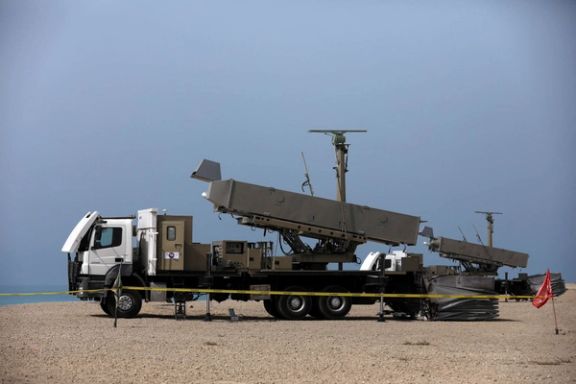
Army Navy vs Guard Navy
Iran maintains two distinct naval forces under separate command structures: the conventional Islamic Republic of Iran Navy -- a force within the traditional army --and the Islamic Revolutionary Guard Corps Navy.
While both are tasked with defending Iranian interests at sea, their missions, capabilities and areas of operation differ, according to a Defense News analysis.
“The IRGC Navy and the Iranian Navy have two separate command structures. While some of their responsibilities overlap, the primary difference is the methods and strategies of operation,” analyst Sina Azodi told Defense News.
He added that the IRGC Navy emphasizes asymmetric operations, relying on fast boats, missile-equipped vessels and hit-and-run tactics, while the traditional Navy deploys larger platforms such as frigates, corvettes and submarines.
According to Mohamed al-Kenany, head of the military studies unit at the Cairo-based Arab Forum for Analyzing Iranian Policies, another key distinction is geography.
Iran’s navy patrols the Gulf of Oman, the Indian Ocean and the Caspian Sea, while the Revolutionary Guard controls the Persian Gulf and the Strait of Hormuz, where it has seized Western vessels and shadowed US warships during past tensions.
Al-Kenany added that the IRGC’s use of naval mines and swarms of small craft makes its anti-access strategy in the Persian Gulf highly effective, while the conventional Navy remains constrained by aging 1970s-era frigates and corvettes and sanctions that block modernization.
Since 1979, the United States has imposed sanctions on Iran that restrict access to advanced military technology, forcing Tehran to rely on indigenous development and adaptations of older systems.
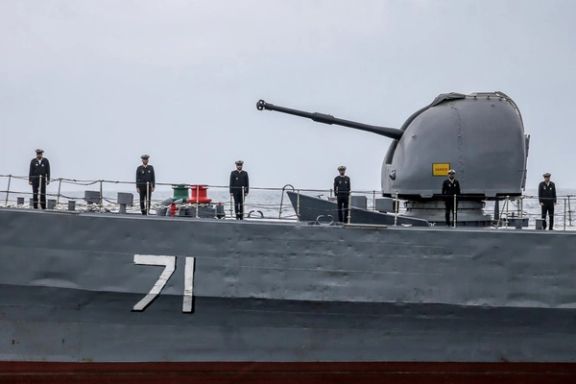
Top commanders call for modernization
Armed Forces Chief of Staff Major General Abdolrahim Mousavi said Iran’s only guarantee of security was to continually upgrade its systems.
“The only way to shield the country from threats is to enhance deterrence and modernize our ground, naval, aerospace, air defense, cyber and electronic warfare capabilities,” he said in a message to Defense Minister Brigadier General Aziz Nasirzadeh.
Nasirzadeh himself told reporters on Wednesday that Iran had developed a new generation of missiles with greater capabilities than those used in the June conflict.
“The missiles we used in the 12-day war were built several years ago. Today we possess missiles with far better capabilities, and if the Zionist enemy embarks on another adventure, we will certainly use them,” he said.
He added that Israel’s missile-defense systems, including the US-made THAAD, Patriot, Arrow and Iron Dome, had proven ineffective. “In the early days, about 40% of our missiles were intercepted, but by the end of the war, 90% were striking their targets,” he said.
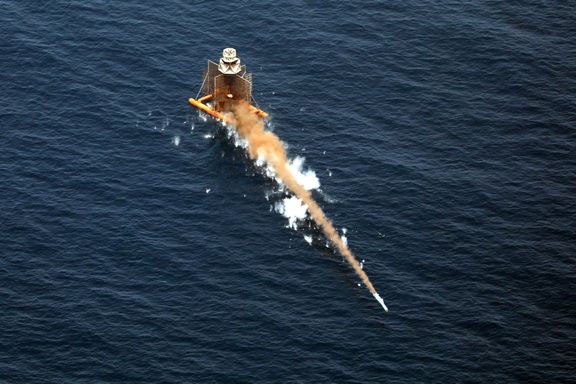
'War is not over'
Earlier in the week, Senior Revolutionary Guards general Yahya Rahim Safavi, now top adviser to Supreme Leader Ali Khamenei, dismissed the June ceasefire as temporary.
“We are not in a ceasefire, we are in a stage of war. No protocol, regulation, or agreement has been written between us and the US or Israel. I think another war may happen, and after that, there may be no more wars,” he said.
Safavi argued that Iran must continue to expand its diplomatic, cyber, missile and drone capabilities. “In the system of nature, the weak are trampled. Therefore, Iran must also become strong,” he said.
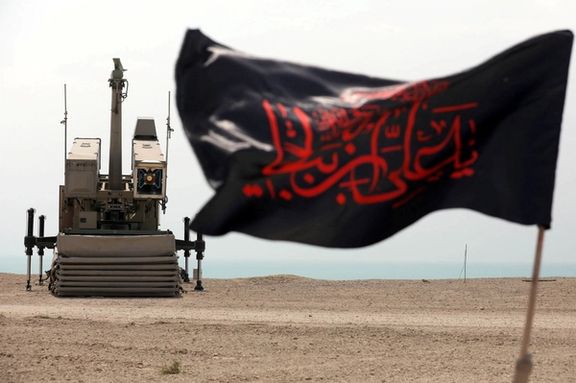
Israel vows readiness
Israel’s military chief Lt. Gen. Eyal Zamir said earlier this month the June campaign had been a preemptive strike to eliminate an “emerging existential threat” from Iran.
“If necessary, we will know how to act again with precision, intensity and lethality,” he said.
Israel launched surprise strikes on June 13 that killed senior Iranian commanders and nuclear scientists and damaged nuclear and air defense sites. Iran says 1,062 people were killed, including 786 military personnel and 276 civilians.
Iran retaliated with missile and drone attacks that killed 31 civilians and one off-duty soldier in Israel. The conflict ended with a US-brokered ceasefire on June 24.
Both Tehran and Tel Aviv claimed victory in June, but the rhetoric since then has underscored the fragile truce and the risk of a renewed confrontation in the region.
